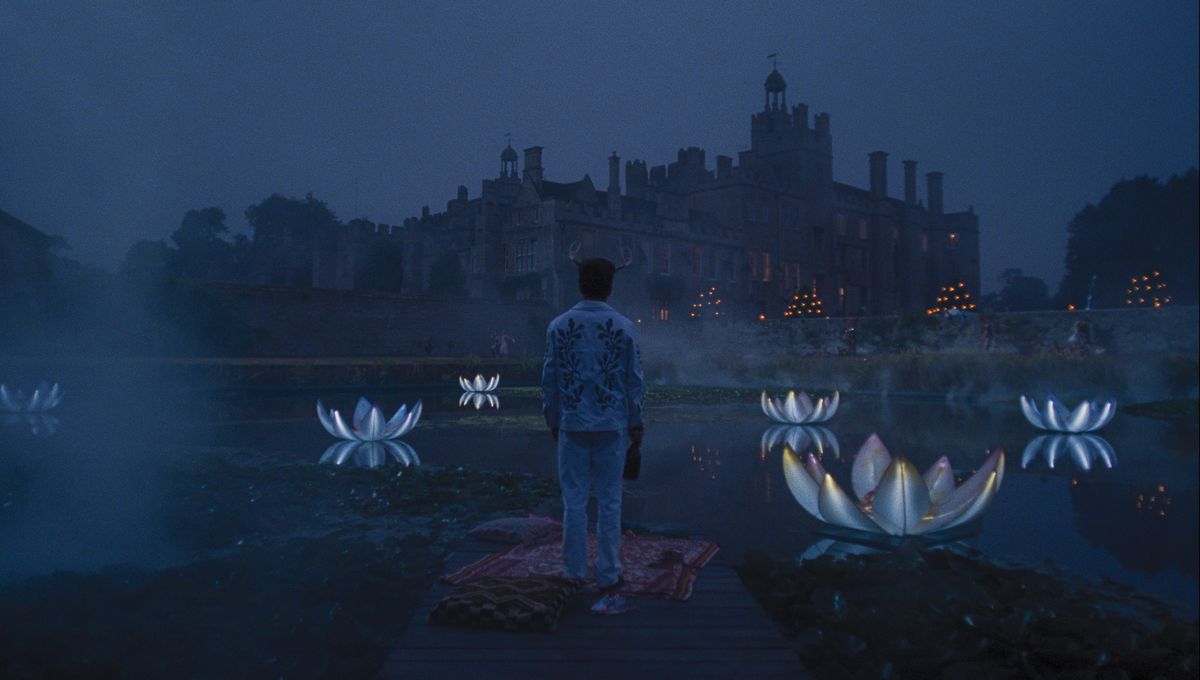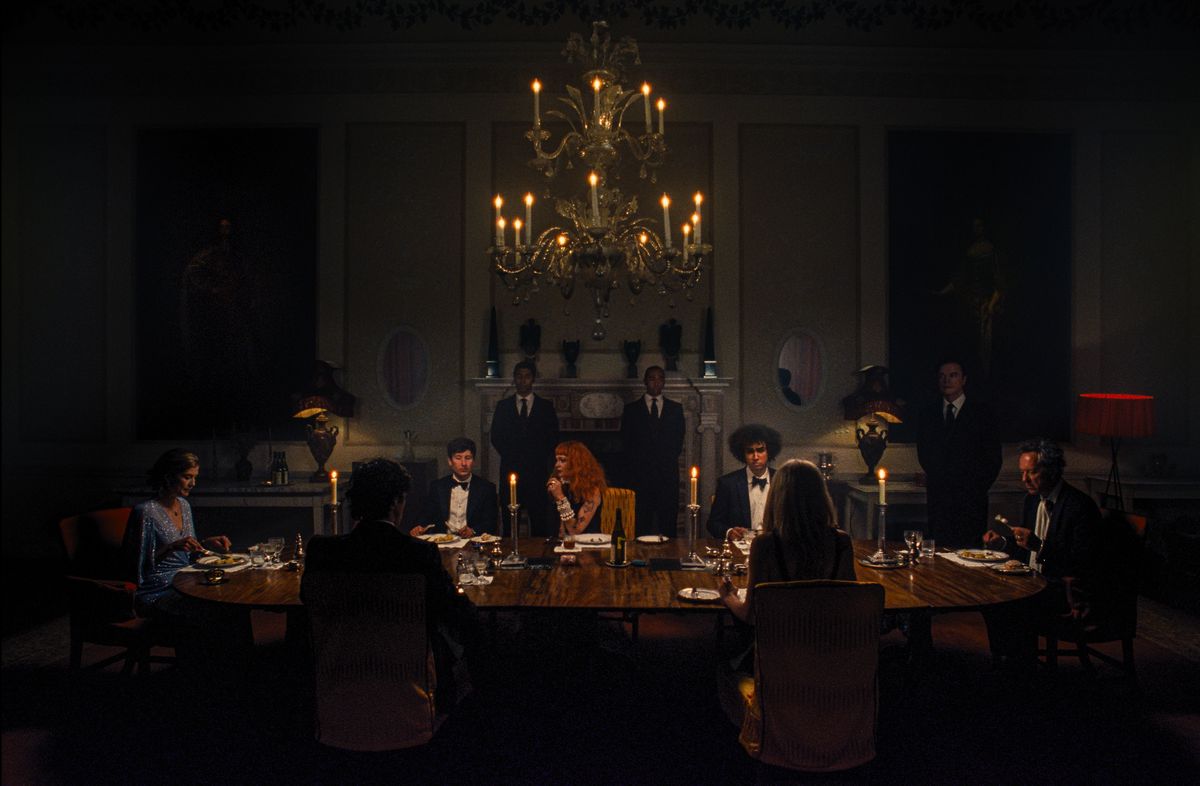As the environmental, political, and above all, economic tension between the ultra-rich and the rest of the world continues to grow, it’s a topic that keeps driving dark, memorable movies — from Bong Joon-ho’s Oscar-winner Parasite to 2022’s The Menu, Pig, and Triangle of Sadness to a sub-track at the 2023 Fantastic Fest film festival, including this year’s Nick Stahl movie What You Wish For and the blistering Brazilian movie Property. Emerald Fennell’s Saltburn, which played as a secret screening at Fantastic Fest, seems to fit the bill perfectly as well: It follows an Oxford freshman, Oliver (Barry Keoghan, sure to turn up in awards-season conversation again) as he awkwardly infiltrates the social circle of his ultra-rich classmate Felix Catton (Priscilla co-star Jacob Elordi). What follows is part horror movie, part classic Gothic novel, as Oliver hungers to be like Felix — or just to be Felix.
But in an interview after Fantastic Fest, Fennell told Polygon she doesn’t entirely see Saltburn as yet another eat-the-rich exercise.
“I think I consider it more ‘Lick the rich, suck the rich, and then bite the rich, and then swallow them,’” she said.

Saltburn is an intoxicating experience: a visually rich, caustic crime thriller in the vein of The Talented Mister Ripley. Oliver, whose background takes a while to fully unfold within the film, is obsessed with the luxury, comforts, and casual arrogance of Felix and his wealthy family. But as they spend more time with Oliver, embracing his attractiveness and cleverness and welcoming him into Saltburn, the family estate, they also drop hints that he’s probably just the plaything of the season, likely to be discarded out of boredom.
Fennell’s movie — her follow-up to the challenging, much-discussed revenge story Promising Young Woman — isn’t entirely sympathetic toward Oliver, who’s clearly grasping and needy as well as ruthless. At the same time, it isn’t fully on board with Felix and his superficial, selfish family members, either.
“It’s really about having sympathy with everyone, always,” Fennell says. “Certainly for me as a writer and director — and for the actors, too — it always has to be an exercise in empathy. None of these people thinks of themselves as a bad person. It was the same with Promising Young Woman. It’s not interesting for me to make things that make moral judgments about people — all I’m interested in doing is understanding. So for me, the first thing about the Catton family was that we understood why Oliver would be, against his better judgment, completely and utterly beguiled.”
As Fennell has explained in other interviews, Saltburn is a movie about fame, fandom, the internet, and parasocial relationships, about the kind of connections people make from a distance and build into elaborate, often unhealthy fantasies. Part of drawing that line was making Felix the kind of superstar who would earn a fandom: He’s handsome, charming, and skilled at everything he tries, but he’s also surprisingly kind.
“It’s the thing about Felix — we think we’re going to hate him, we assume we’re going to hate him,” Fennell said. “And then the moment we meet him for the first time, it’s impossible to resist. They’re all impossible to resist. The world is impossible to resist. It was important that we understood from the get-go why, against our better judgment, we would all want to be at Saltburn, and would do anything to get in and anything to stay.”

Both Saltburn and Promising Young Woman are about toxic hunger, about a protagonist so monomaniacal about getting something that they’re willing to cut any moral corners to get there. In terms of other connections, though, Fennell says her own obsessions may be showing in the new film.
“You’re always trying to do something new and make something different, but you can never get too far away from yourself,” she says. “I think certainly I have a preoccupation with genre, and the way we use it as filmmakers and experience it as cinema goers. Promising Young Woman was looking at the specific genre of the female-lead revenge movie. Saltburn is looking at the Gothic country-house tradition. Promising Young Woman was looking to subvert the genre, and that’s exactly what I’m hoping to do here.”
The reason Saltburn feels like so many classic British stories about class, Gothic manors, and dark secrets is because Fennell wanted the movie to be a recognizable world, a genre exercise where viewers think they know what the rules are, and what’s coming next.
“It’s only with that familiarity that you can really apply pressure, and dig into the genre,” Fennell said. “So stylistically, I’m always going to be preoccupied with where a movie exists in the world of movies. You can’t pretend a movie exists outside of the world.”
As far as other comparisons to her work go, Fennell notes that both Promising Young Woman and Saltburn are thwarted love stories. “They’re stories about what we do with love that can’t be, for whatever reason, that can’t carry on in the form it starts in. With Promising Young Woman, it was the love story between Cassie and Nina, and it was a love story with Ryan, Bo Burnham’s character — both of them loves that kind of can’t work out. And Saltburn is a movie about loving someone, and loving his world — a world that’s never going to love you back. What do you make yourself into? What do you do to yourself when that becomes apparent? How do you get that love?”
It may seem a little counterintuitive to compare internet fame with Gothic novels like Brideshead Revisited, Wuthering Heights, and Northanger Abbey. But Fennell thinks of these books and online obsessions as closely connected.

“There is always a tension, always, between ourselves and other people,” she said. “If the Gothic tradition is about an outsider being introduced to a world which is both desirable and frightening — that’s absolutely what we’re doing with the internet, and our relationship with the world of fame and beauty.
“Online, fame isn’t just about people anymore. It’s about their wardrobes, the way they organize their wardrobes, the labels they put on their drawers, every detail of people’s lives. It’s their food, their clothes, it’s everything. I think we are absolutely, now more than ever — and particularly post-COVID — in this kind of voyeuristic, sadomasochistic relationship with these things. I certainly, myself, feel a new desire post-COVID to touch.”
Referencing one of the more visceral and much-described scenes in Saltburn, where Oliver licks Felix’s bathwater out of the drain, Fennell said, “I think it makes sense that this film is preoccupied in many ways with the stuff of human secretion, in whatever form that is. There’s a transgression now, post-COVID, to touching and feeling, and getting intimate, in ways that may be surprising. And I think that’s absolutely what the Gothic tradition was always about. It was about introducing people, but particularly women, to this idea of the transgressive desire, and the things that maybe weren’t within reason. They’re outside of reason, they become completely all-consuming.”
Saltburn is in theaters now.
- SEO Powered Content & PR Distribution. Get Amplified Today.
- PlatoData.Network Vertical Generative Ai. Empower Yourself. Access Here.
- PlatoAiStream. Web3 Intelligence. Knowledge Amplified. Access Here.
- PlatoESG. Carbon, CleanTech, Energy, Environment, Solar, Waste Management. Access Here.
- PlatoHealth. Biotech and Clinical Trials Intelligence. Access Here.
- Source: https://www.polygon.com/23973198/saltburn-interview-emerald-fennell-eat-the-rich-internet-fame
- 2023
- a
- About
- above
- absolutely
- actors
- after
- again
- Against
- All
- also
- always
- an
- and
- Another
- any
- anymore
- Anything
- apparent
- appears
- apply
- ARE
- as
- assume
- At
- away
- back
- background
- bad
- BE
- Beauty
- because
- become
- becomes
- being
- Better
- between
- beyond
- Bill
- Black
- Bo
- board
- bong
- Books
- both
- Brazilian
- British
- build
- but
- CAN
- Candles
- carry
- Carry On
- casual
- certainly
- challenging
- character
- cinema
- Circle
- class
- Classic
- clear
- clearly
- closely
- coming
- comparisons
- completely
- connected
- Connections
- Consider
- continues
- Conversation
- corners
- covered
- Crime
- Cut
- Dark
- Deer
- desire
- detail
- different
- dig
- Director
- distance
- do
- doing
- drain
- Drawing
- driving
- Drop
- Earn
- Economic
- either
- Elaborate
- embracing
- Emerald
- Empathy
- entirely
- estate
- EVER
- Every
- everyone
- everything
- exactly
- except
- Exercise
- exists
- experience
- explained
- eyes
- Face
- FAME
- familiarity
- family
- family members
- far
- feel
- fest
- festival
- Film
- filmmakers
- First
- first time
- fit
- follows
- food
- For
- form
- from
- full
- fully
- Gaming
- Genre
- Get
- getting
- go
- going
- Grow
- has
- hate
- Have
- having
- he
- her
- here
- him
- hints
- his
- hoping
- Horror
- How
- HTTPS
- huge
- human
- Hunger
- i
- idea
- immense
- important
- impossible
- in
- Including
- interested
- interesting
- Internet
- Interview
- Interviews
- intimate
- into
- introduced
- introducing
- Is
- IT
- ITS
- jacob
- jpg
- Judgment
- just
- kind
- know
- Labels
- latest
- like
- likely
- Line
- Little
- lives
- Long
- Look
- looking
- love
- loves
- loving
- lowered
- luxury
- make
- MAKES
- Making
- many
- May
- maybe
- me
- meet
- Members
- memorable
- moment
- moral
- more
- movie
- Movies
- myself
- never
- New
- Next
- nick
- None
- not
- notes
- novel
- now
- of
- often
- oliver
- on
- One
- online
- only
- or
- Other
- our
- ourselves
- out
- outside
- over
- own
- Oxford
- part
- particularly
- Party
- People
- perfectly
- person
- plastic
- plato
- plato data intelligence
- platodata
- platogaming
- played
- Polygon
- position
- pressure
- probably
- promising
- protagonist
- put
- really
- reason
- reflecting
- reflection
- relationship
- Relationships
- REST
- revenge
- rich
- room
- rules
- ryan
- Said
- same
- says
- scenes
- screening
- season
- Secret
- secrets
- see
- seem
- seems
- sense
- she
- sits
- skilled
- So
- Social
- someone
- something
- specific
- spend
- standing
- stands
- starts
- stay
- Stories
- Story
- sure
- surprising
- table
- takes
- talented
- terms
- than
- that
- The
- the world
- their
- Them
- themselves
- then
- there
- These
- they
- thing
- things
- think
- this
- though
- TIE
- time
- to
- told
- too
- topic
- toward
- tradition
- trying
- turn
- understanding
- understood
- up
- use
- very
- viewers
- visually
- want
- wanted
- was
- way
- ways
- we
- wealthy
- welcoming
- well
- What
- whatever
- when
- where
- while
- white
- WHO
- whose
- why
- willing
- wish
- with
- within
- woman
- Women
- Work
- work out
- world
- would
- writer
- yet
- you
- young
- yourself
- zephyrnet












